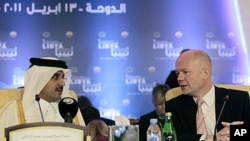The small state of Qatar is playing a large role in the Libya conflict. In addition to hosting a conference Wednesday on the future of the North African country, Qatar has made its presence felt on the rebel side with military aid and morale boosting. Our correspondent has more from the defacto rebel capital Benghazi.
The expression of anti-government sentiment has flourished in eastern Libya, but perhaps few media outlets have such reach as the new Libya Channel.
The satellite service brings together news and voices from across the country to a people largely cut off from some of the most basic forms of communication.
Despite its apparently indigenous nature, few here are surprised that the drive - and money - behind the effort is Qatar.
The Gulf state was the first Arab nation to recognize the rebel's Transitional National Council as Libya's legitimate government. Doha is taking part in the enforcement of a no-fly zone and helping the rebels sell oil on the world market. As for arms, anti-government forces simply shrug and smile when asked if Qatar is behind the new weapons seen at the rebel's front lines.
Benghazi businessman Najib Mohammed has nothing but praise and thanks for Qatar's role.
He credits the Qatari leader for helping prevent the deaths of what he guesses would have been thousands of people at the hands of government forces.
Standing outside rebel headquarters, his friend, Wahib Abd Samad, offers a possible motive of why Qatar, nearly alone among the Arab nations, has taken such a strong stand in the internal conflict.
"I have seen Qatar in many good positions," said Samad. "[It] likes to support the people, not the government. Qatar is a nice emirate."
The government in Tripoli takes a different view.
"Qatar is hardly a partner of any kind, it's more of an oil corporation than a true nation," said Moussa. "And the Emir of Qatar is an oppressive dictator who does not represent any liberal values," said spokesman Ibrahim Moussa.
But it is exactly Qatar's oil wealth, and the liberal idea of free speech, that have riled regional autocrats and given it far greater influence than its size would suggest. The Doha-funded al Jazeera network has been accorded a key role in the anti-government protests sweeping North Africa and the Middle East.
And while leaders in Syria and Yemen crack down on their opposition, and Saudi Arabia sends tanks to help Bahrain do the same, Qatar appears intent on carving out a niche role.
Abdalla al Ashaal, a professor of politics at the American University in Cairo, says it can be seen in various places across the Arab world.
"They are playing a very constructive role with the rebels of Darfur in Sudan," said al Ashaal. "And now they are trying to help the rebels in Libya despite the fact that [Libyan leader Moammar] Gadhafi had no quarrel with the Qatari government before."
Al Ashaal calls its influence in Libya another card in Qatar's increasingly full hand.
Libya Conflict Spotlights Qatar's Growing Influence




